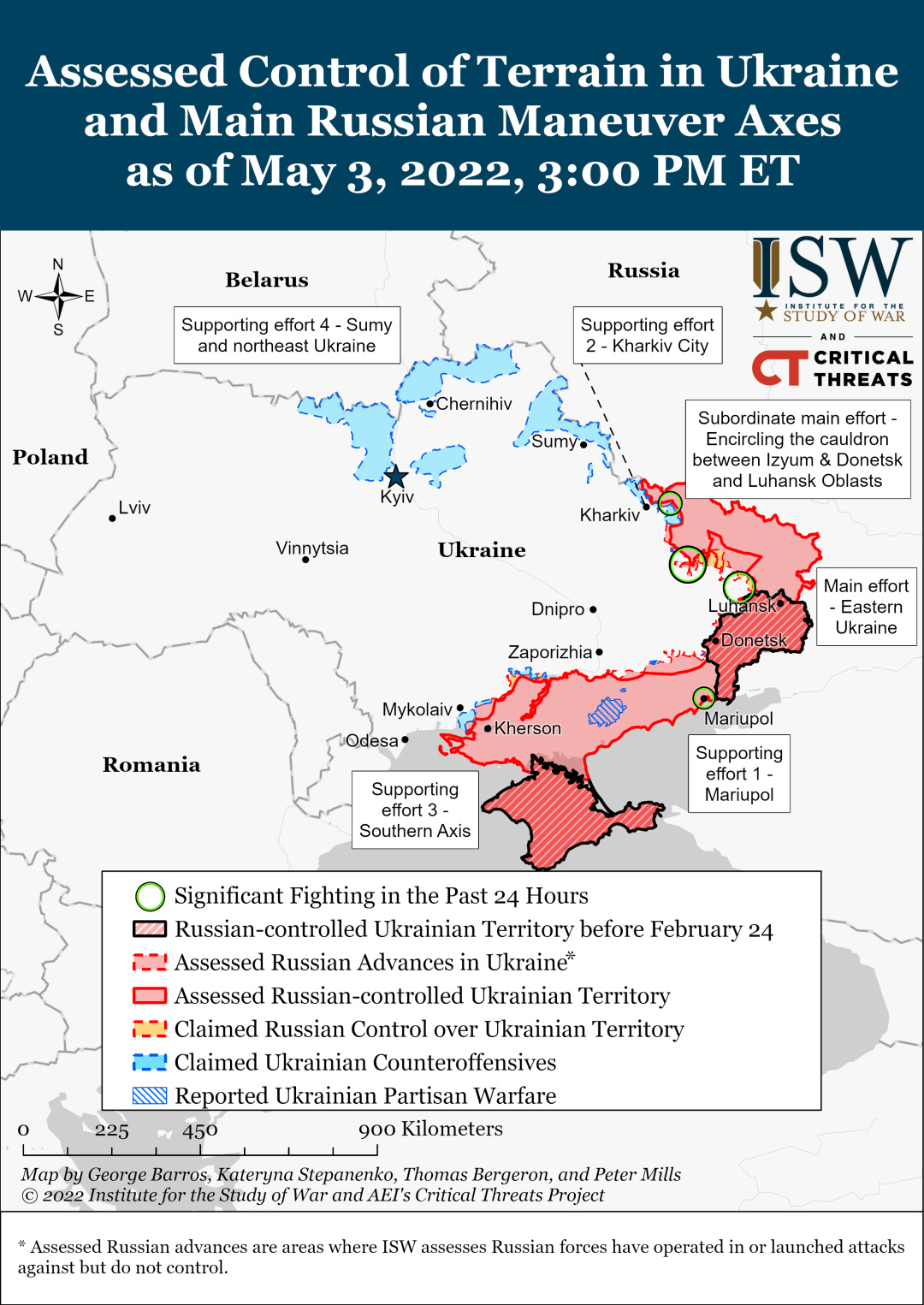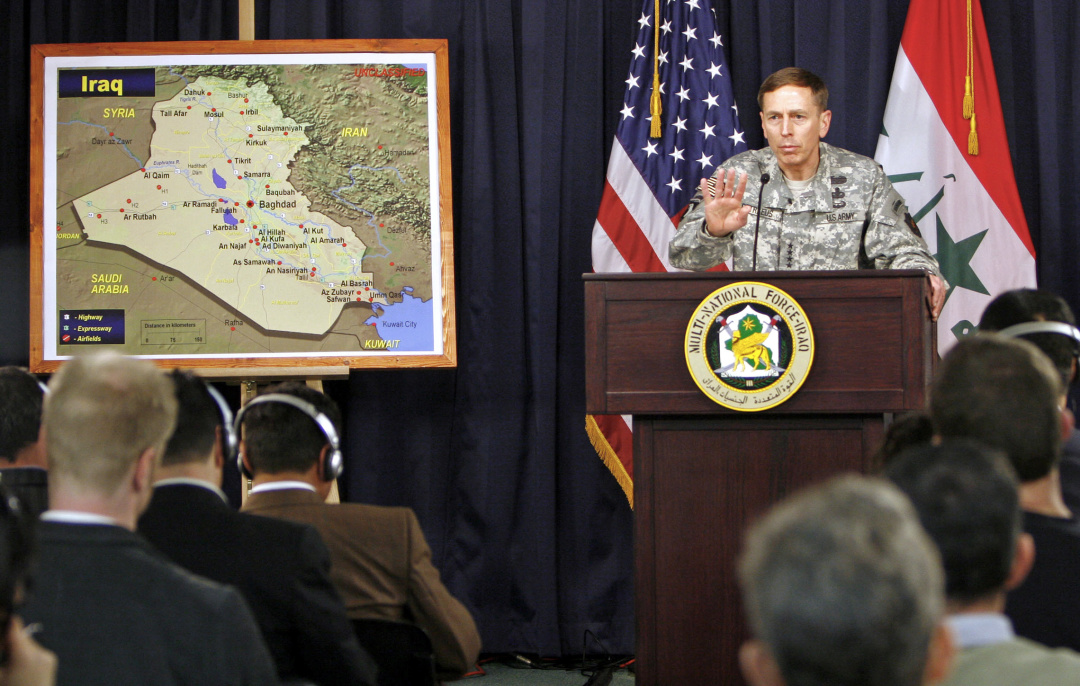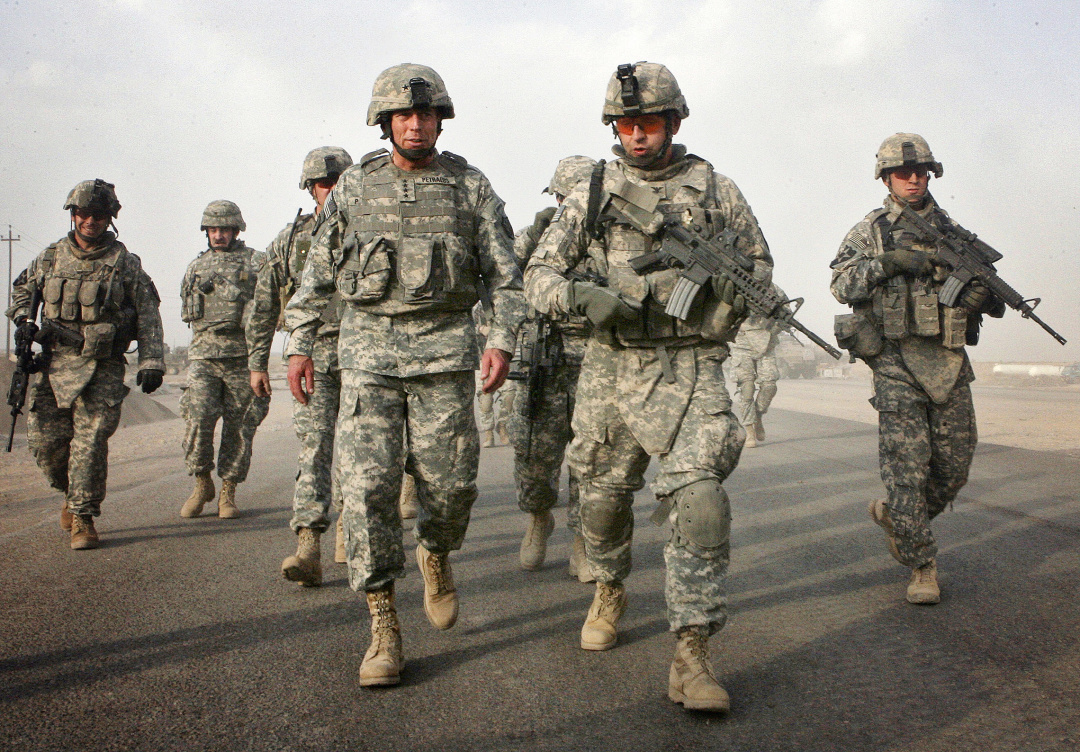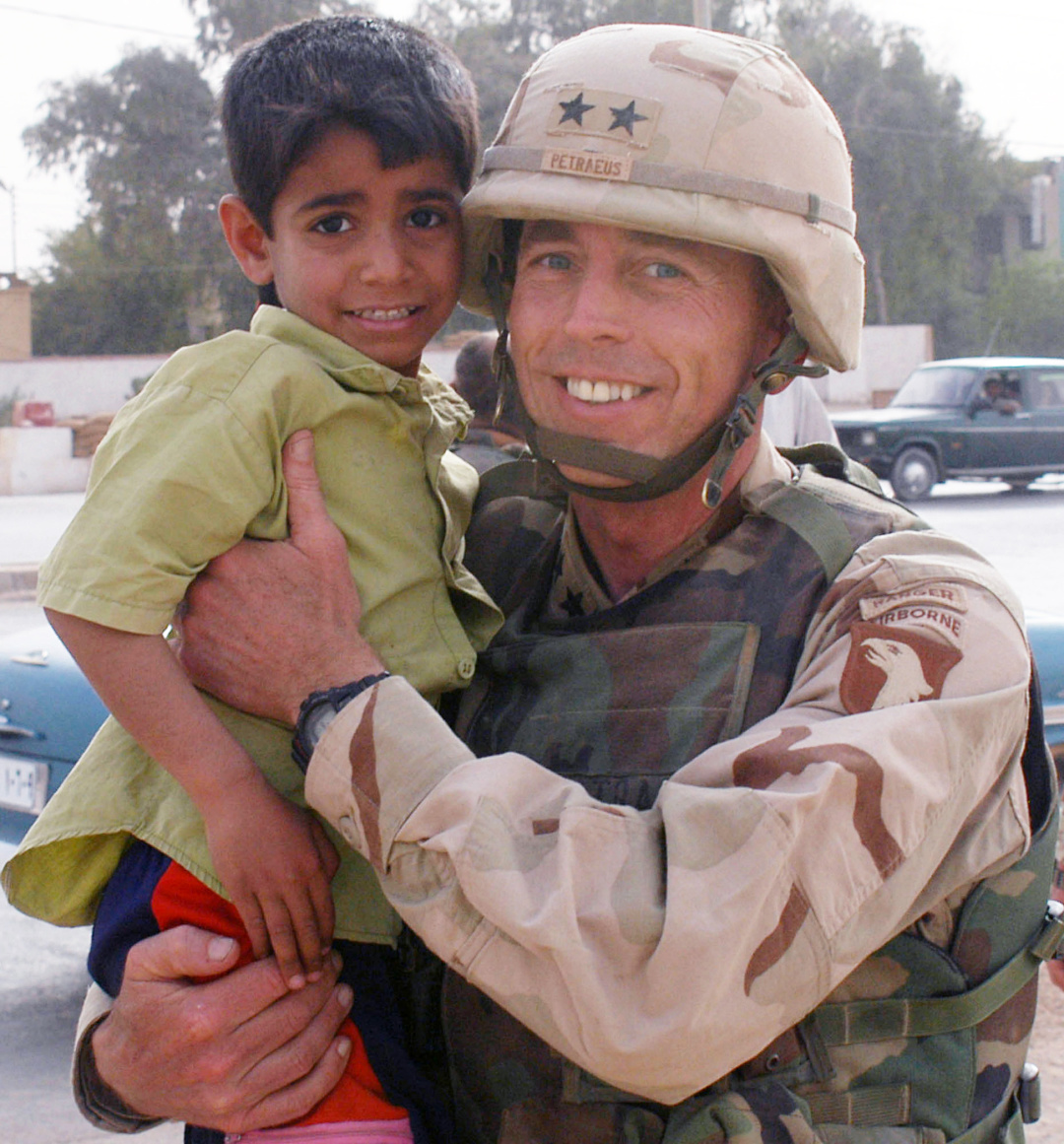Ukraine has already won the battles in the north, ruining Kremlin's plans to install a pro-Moscow government in Kyiv. The Russians had to retreat from the northern part of Ukraine with huge losses, but now they are trying to succeed in eastern and southern Ukraine. At the same time, Kyiv is receiving unprecedented assistance from the West and continuing to defend against scaled Russian aggression.
Whose side is the advantage now, what deficiencies does the Russian army show, and what does Putin intend to do by May 9? Retired 4Star General David Petraeus, who commanded the U.S. and international forces in Afghanistan and Iraq and headed the Central Intelligence Agency (CIA), commented on these issues in an interview with Ukrinform.

- General Petraeus, you're on the board of the Institute for the Study of War, and you regularly share insights on the current situation based on those reports. Can you please provide a high-level situation report based on your current perspective of the war?
- Well, I think we're in a pivotal place in the war in Ukraine right now. Ukraine won the initial battles, the battles of Kyiv, Chernihiv, and Sumy, from which the Russians withdrew their forces after failing to take the capital, failing to topple the government, and failing to install a pro-Russian president in place of President Zelensky.
They then focused their efforts on the east and southeastern parts of the country, having also failed to get even halfway to Odessa. They had wanted to go through Mykolaiv but could not even get the two bridges that cross the river through Mykolaiv to get to Odesa. So that objective is also beyond their reach.
The focus now again, is on achieving as much additional ground as they can in southeastern Ukraine, south of Kharkiv, pushing out from the Donbas the portions of the Donetsk and Luhansk Oblasts that have been controlled over the past few years by the Russian supported separatists. And then pushing up also from the area around Mariupol, the port city in the southeastern part of Ukraine, in which there are still defenders holding out in these huge steel complex that is right on the water in that port city.
The Russians have achieved some very hard-fought gains at a very high cost. They have sustained very significant losses in terms of personnel, major weapon systems, vehicles, and so forth. But clearly, they are still capable of carrying out very destructive missile, rocket and bombing attacks, literally throughout Ukraine. And then also bringing to bear very considerable numbers of multiple launch rocket systems and artillery to the areas that are more along the front lines.
Ukraine is rushing to bring into action the enormous amount of weapons, equipment, ammunition, and so forth, being provided by the United States, the UK, and other NATO and Western nations. They are bringing these assets into the front lines.
And I think that over the course of the weeks that lie ahead that we’ll see the Ukrainians increase the pace of their counterattacks in the east and in the southeast. But again, this is a pivotal time with Russia, trying to achieve as much progress as it can prior to the 9 May celebration of the WW2 victory in Moscow, at which time Vladimir Putin would undoubtedly like to report a great success that would justify the colossal cost that he has inflicted on his country, on his military and on Ukraine.

- Almost all the liberated cities that were under the temporary occupation of Russian forces, reported facts of inhumane treatment of the local population by those Russian forces, such as mass killings, executions, rapes, and torture. These are not accidental cases. This is a system based on your observations and past experiences of war. What countermeasures, if any, can Ukrainian noncombatants do consider these Russian tactics?
- Well as the questioner rightly noted I think it's accurate to say that there is a culture of war crimes that permeates all of the Russian units.
This is not an aberration. This is not an exception, as it would be in our military. I should note that we made mistakes over the years. We essentially broke the International Law when it comes to the law, land warfare to the Geneva Convention.
From time to time, some of those were particularly significant such as what took place at the detention facility just west of Baghdad. But those were exceptions, and when those happened, as you will recall, we then did investigations that were honest and accurate.
We determined what happened. We took remedial action. We took action, punitive action and we spread the word to make sure that we didn't do that again.
In the case of the Russians, it appears that it is cultural to carry out these kinds of criminal activities.
I think the only action that can be taken and has been taken frankly is to document this as carefully as is absolutely possible so that there can be over time.
International awareness of what has taken place of the culture that does permeate the Russian system and not just the tolerance, but the encouragement of this direction to take these inhuman and also inhumane activities. So again, documenting this, and every person with a smartphone these days is a reporter.
There are social media platforms under which this kind of activity can be uploaded. And certainly, that is what should be done.
If I could point out by the way, because the questioner asked or had the question that this is a counter-insurgency. Actually, this is not. This is still just in large measure conventional warfare. There might be insurgency activity inside a city that is occupied by Russia, like Kherson or Mariupol, or some of the others in the south and southeast, and a few in the Eastern part of the country but by and large Ukraine is not occupied by Russian forces, and you, therefore, don't need insurgency activity, or support for insurgents.
Ukrainians need support actually for frontline forces, and that's really what the Ukrainian people are doing so impressively.
They are ensuring that these soldiers have hot food that they have an opportunity to rest when they can come off the front lines and that they're supported in every possible way. And that includes some activities that actually are very, very significant to disrupting, for example, the command-and-control system of the Russians.
It's well known now that the Russian communication system is not the sophisticated frequency hopping secure transmissions that we knew in our military. Rather it is actually in the open on HF high frequency or radio channels without encryption.
So, any Ukrainian citizen with a police scanner or a Ham radio operator can actually identify these channels, find them, listen to them, and record them. If it's interesting for example when Russian soldiers are criticizing their leaders, which goes on quite regularly, and then jam them literally by transmitting over top of them as you would appreciate.
That's just one of many, many activities that Ukrainian civilian citizens have been taking that are actually an enormous help to the soldiers on the front lines.
Because in this case the inability to communicate from high levels to low levels requires the generals and also the battalion, brigade, and regimental commanders to come to the front to get out of their vehicles and when they do that very skilled Ukrainian snipers are picking them off. It's at least ten or eleven Russian general officers that have been killed, so far. That is a staggering number when you consider that the entire U.S. Military lost one general officer during the course of our decades in Iraq and Afghanistan.
And so, this is a huge blow to the Russian leadership, and you can imagine that the numbers of battalion and brigade commanders are many multiples of those in the general officer ranks.
There are examples of Ukrainian citizens who are just reporting what Russians are doing within sight of those citizens.
There are activities that can assist in terms of providing various logistical support that might be possible from citizens to the soldiers again on the front lines. The list is very considerable, and what has been so admirable and impressive about the Ukrainian citizens is that everyone has gotten into the fight.
Everyone is trying to help the soldiers, the military, those who are actually on the front lines, and those who are in other positions and other duties behind the front lines supporting those on the front lines.
So, you really have a nation in arms. You have an entire nation that has been mobilized by very inspirational leadership at the very top led by President Zelenskyy and those around him. And that is not just inspiring those within Ukraine it has also been a major factor in inspiring those outside Ukraine to support those who are there.
I think in the early days there was a real question about whether the Ukrainian forces could withstand the assault of the Russians. A lot of observers overestimated of course, what the Russians would do, and underestimated what the Ukrainians would do.
At the Munich Security Conference, one of the questions that I had for the Ukrainian Parliamentarians who were there - was to ask, we really need to know whether you are all truly going to fight.
Well, that question has been more than answered. Everyone is engaged in this, and of course, no adult males have left the country. They're all staying and contributing but so are those again of all ages, and sexes. Everybody is in this fight, and that is one of the reasons that so many people around the world have been inspired to help.

- Russian disinformation and psychological operations are at a high tempo. What is an example of effective countermeasures, tactics, and techniques that you've seen the Ukrainians use that they should consider reapplying in future operations, especially if the war goes into a long-term insurgency?
- Well, here it is not just Ukrainians it is international reporters. It's “Netizens” in other words those who are on the Internet. And who are helping the cause? It is anyone who is trying to capture, to report, to share accurate information ground truth. Verify it, and then share it with the rest of the world.
And what is unique about this particular war is again the very widespread availability of smartphones which enable anyone with one to be essentially a news reporter. The equal availability of social media platforms onto which videos and photos and reports can be uploaded and shared, and then even aggregators who bring it all together and make sense of it and verify it. There's a platform for example or Oryx. (https://www.oryxspioenkop.com)
I believe it is that has a particular site within it that does nothing but verify and validate and report Russian vehicles, weapons, systems, and so forth, that have been destroyed, captured, abandoned, or what have you.
It may be that we're nearly at three years’ worth of tank production of the Russian manufacturing sector that had been destroyed. This is irreplaceable, especially given the microchip sanctions that prevent the export to Russia of microchips that were built on the U.S. and intellectual property, which is certainly all the best ones in the world. And the absence of those in the lack of availability for Russia to have access to those will prevent them from rebuilding or constructing manufacturing many of the munitions and weapon systems that Russia has lost during the first 2 months of this war alone. Again, the numbers are really extraordinary.
And you have groups like the Institute for the Study of War where I serve on their board, is pulling together all information that they have - has a superb team, monitoring the actions of Russia and Ukraine,
These kinds of groups, I think, are hugely important, because they are not subject to Russian disinformation. They are just trying to establish the ground truth, and then report it, without influence from any outside source.

- General you studied Russia since the 1970s from the tactical to the strategic level, and you know them well. With that knowledge and the knowledge of the Ukrainian people, what are your words of advice, encouragement, or anything else you want to say directly to the Ukrainian people?
It's three times important as important as just sheer numbers or sheer weapon systems, or what have you, and I don't think any war has validated that more than this one. As I mentioned earlier, there were an awful lot of observers who did not appreciate how strong the Ukrainian resistance was going to be. I should note that I did note upfront my sense that the Ukrainians were going to fight very hard because I've seen them. I went to Ukraine the most recent time before the pandemic. Not long after President Zelenskyy was elected, and I did go down to the Donbas. I was in the front lines there, and I got a sense of this, how tough and determined, and capable the Ukrainian forces were at that time, and again there's been more improvement since then.
And then you've had the very rapid supply of extraordinary amounts of Western, and then also some Eastern military weapon systems, and vehicles, and so forth. And so, what you have is a force that is absolutely resolute, as sheer indomitable will, that is now enabled by some of the best military technology in the world. But at the end of the day, it really is about heart. It's about an entire country that refuses to allow an unprovoked invasion to take their territory.
And I think before this is all said and done, that the Russians will surrender much of what they have gained, not because they gave it up, but because the Ukrainians took it back. And I think again, the next week or two will be pivotal, both because of the approach of the World War 2 victory celebration in Moscow on 9 May again, at which Vladimir Putin would like to have significant victories to announce, but likely will not.
And then as the Ukrainians introduce all this new capability into their forces, they will retake some of the territory that they had to grudgingly give up under the pressure of the Russian offensive in the East and in the southeast.
Most of all, I think what I’d like to leave with those who might view what I say it's just the enormous admiration that I think everyone has developed around the world for what Ukraine as a country is doing.
As always, it's not about just one leader or one unit or one element it's about a team and a team of teams. And this particular team of teams has been absolutely brilliant. And again, truly inspirational. And the same cannot be said for the other side which has again demonstrated a culture of carrying out war crimes, a lack of initiative at the front lines lack of tactical standards and training, lack of campaign design, inadequate logistics, poor maintenance.
Really every deficiency I think that you could imagine in a military force is being demonstrated by the Russians with a couple of exceptions, and one of those is this sheer capacity to create damage and destruction and kill innocent civilians.
But on the other side is this extraordinarily admirable Ukrainian nation which has been brought together uniquely by the actions of Vladimir Putin.
He has contributed more to the sense of Ukrainian nationalism than any other force I think, in the history of the country. It is quite remarkable. it's the opposite of what he intended to achieve I am sure, just as what he has achieved is to make NATO great again, not Russia great again.
But that is where we are and again the Ukrainian people need to know that the world, the eyes of the world are on them; they have been on them, and they will be on them.
And what they have done has generated not just sympathy, not just appreciation, but very, very considerable support. And my sense is that, that support will continue. The opinion polls in the United States say that nearly 75% of Americans support what we're doing, or doing even more, which is remarkable in this country, and I think that - that is true throughout many countries throughout the world.
We respect them for that. We admire them for that. And we will be with them as this carries on.
Mike Robinson, on behalf of Radio Free Ukraine, specifically for UKRINFORM.
Photos provided by the author
